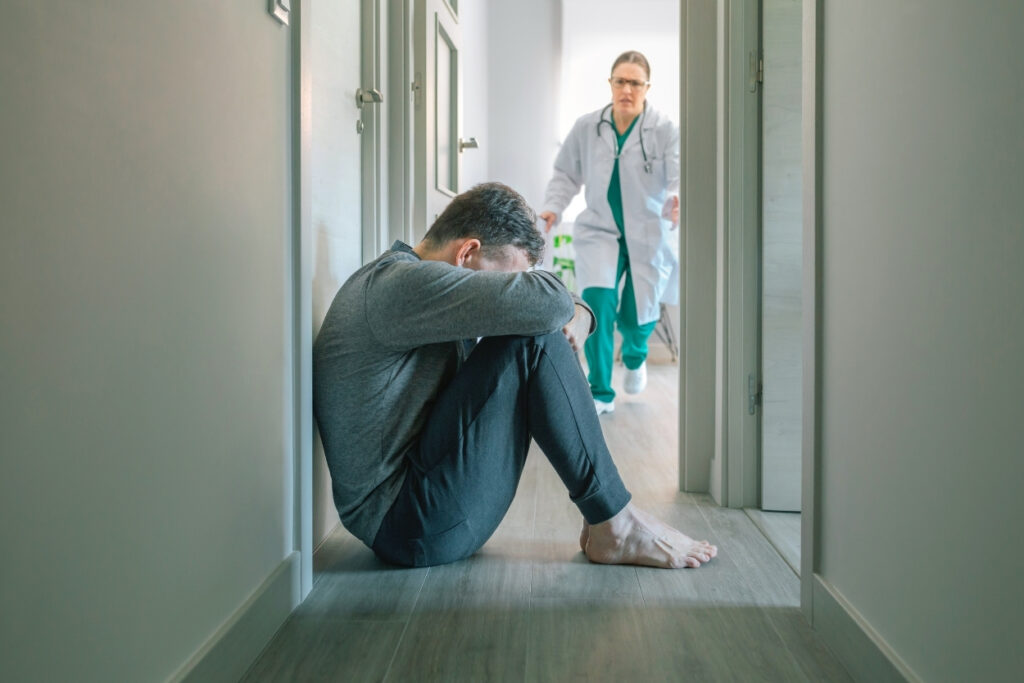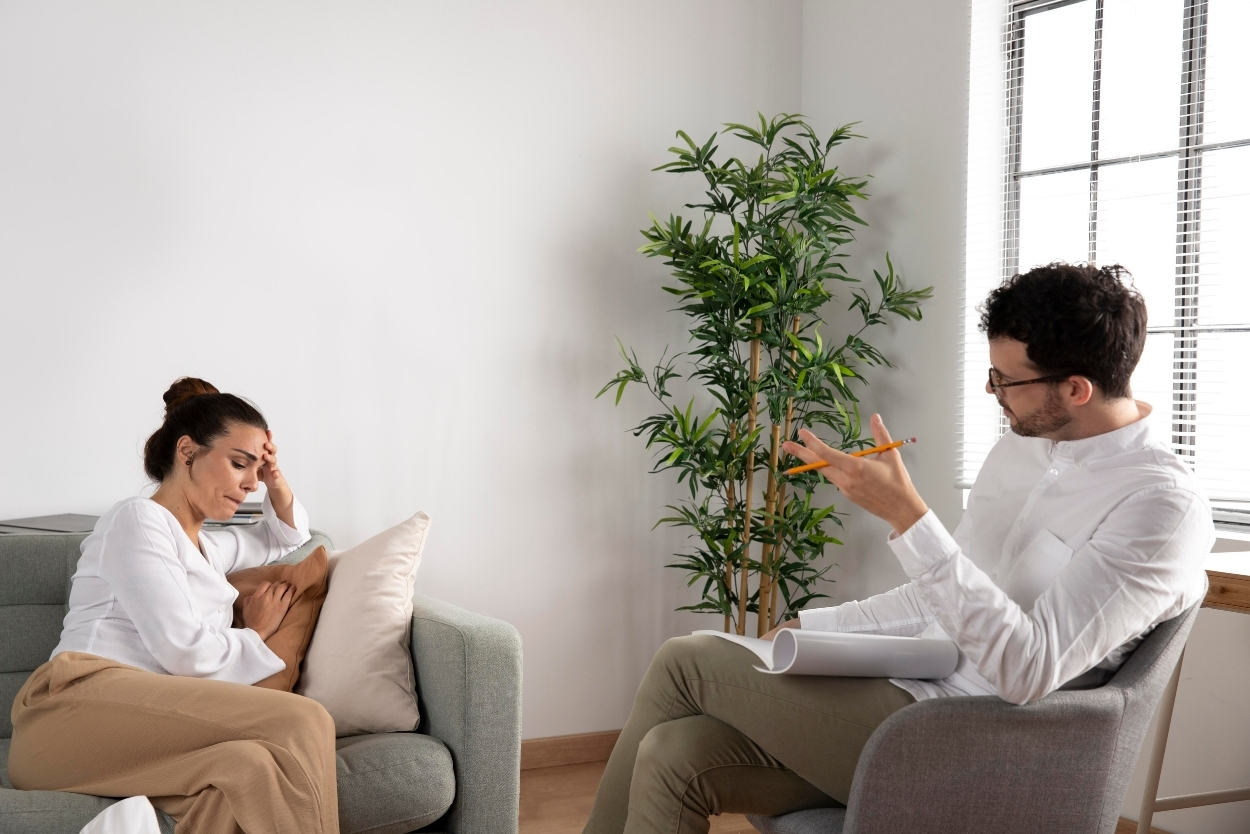Finding the right anxiety doctor is a crucial step in managing and overcoming anxiety. Anxiety disorders are the most prevalent mental health conditions in the U.S., affecting over 40 million adults or 19.1% of the population. The first appointment with an anxiety doctor is an opportunity to set the stage for a comprehensive treatment plan. Additionally, it’s the perfect time to ask the right questions and understand your condition and the available treatment options.
Here are the seven essential questions to ask anxiety doctors.
Table of Contents
Key Takeaways
What to Expect During Your First Appointment with Anxiety Doctors
7 Questions to Ask Anxiety Doctors During Your First Appointment
- What Is My Exact Diagnosis?
- What Are My Treatment Options?
- What Medications Are Available, and What Should I Expect?
- What Are the Potential Side Effects of Medication?
- What Should I Do If I Experience Severe Side Effects?
- Would Therapy or Lifestyle Changes Be Beneficial?
- How Will We Measure My Progress?
What is the Role of Anxiety Doctors?
How to Find the Right Anxiety Doctors Near Me
Frequently Asked Questions
Take Control of Your Anxiety Today with Contemporary Care Center in Danbury, CT!
| Key Takeaways ✔ Your first visit with anxiety doctors will involve a thorough evaluation of your symptoms, medical history, and lifestyle to develop a personalized treatment plan. ✔ Understanding your specific type of anxiety is crucial for effective treatment. Each disorder requires a tailored approach. ✔ Discuss medication, therapy, and lifestyle changes with anxiety doctors to understand all possible treatments and find what works best for you. ✔ Inquire about the types of medications available, how they work, and what to expect in terms of effectiveness and side effects. ✔ Learn about common and severe side effects of anxiety medications, and ask how to manage them and when to contact your doctor. ✔ Have a plan for how to respond if severe side effects occur, including immediate actions and potential treatment adjustments. ✔ Therapy and lifestyle modifications, such as CBT and mindfulness practices, can significantly benefit your treatment plan. ✔ Collaborate with anxiety doctors to set treatment goals, monitor symptoms, and make necessary adjustments to ensure long-term success in managing anxiety. |
What to Expect During Your First Appointment with Anxiety Doctors
Your first visit to anxiety doctors typically involves a comprehensive assessment. They will ask you about your symptoms, medical history, lifestyle, and any previous treatments you’ve tried. This thorough evaluation helps them form an accurate diagnosis and develop a personalized treatment plan.
Anxiety doctors may use various tools, such as questionnaires or interviews, to gauge the severity of your anxiety and identify underlying factors that may be contributing to it. By understanding what to expect, you can approach this appointment with a clearer mindset and a set of prepared questions.
7 Questions to Ask Anxiety Doctors During Your First Appointment
1. What Is My Exact Diagnosis?
Anxiety is a broad term that encompasses various disorders, including generalized anxiety disorder (GAD), social anxiety disorder, panic disorder, and phobias. Each type of anxiety presents with different symptoms and requires a tailored treatment approach. Asking anxiety doctors for a precise diagnosis is crucial because it helps you understand what you’re experiencing and why.
- Understanding Different Types of Anxiety: Each anxiety disorder has distinct characteristics. For example, GAD involves persistent, excessive worry about various aspects of life, while social anxiety focuses on intense fear of social situations. GAD affects 6.8 million adults, accounting for 3.1% of the U.S. population, yet only 43.2% of those affected are receiving treatment. Knowing your exact diagnosis helps you and your doctor target the specific symptoms and underlying causes.
- Why Accurate Diagnosis Matters: An accurate diagnosis is the foundation of effective treatment. Anxiety doctors use your diagnosis to create a treatment plan that is most likely to help you. For instance, panic disorder might be treated differently than social anxiety, even though they both fall under the umbrella of anxiety.
Why It Matters: Without a clear diagnosis, treatment can be less effective. By understanding the specific type of anxiety you have, anxiety doctors can recommend treatments that are most likely to work for you, whether that involves medication, therapy, or lifestyle changes.
2. What Are My Treatment Options?
Anxiety doctors have various treatment methods at their disposal, including medication, therapy, and lifestyle interventions. During your first appointment, it’s important to ask about the full range of treatments available to you.
- Medication: Medications such as antidepressants, benzodiazepines, and beta-blockers can help manage anxiety symptoms. Ask anxiety doctors how these medications work, what their benefits are, and how they fit into your overall treatment plan.
- Therapy: Cognitive-behavioral therapy (CBT) is a common therapeutic approach used to treat anxiety. Other forms of therapy, such as exposure therapy, may also be recommended depending on your diagnosis. Understanding the role of therapy in treating anxiety is crucial, as it can provide long-term coping strategies and tools for managing symptoms.
- Lifestyle Changes: Many anxiety doctors recommend lifestyle adjustments such as regular exercise, a healthy diet, sufficient sleep, and mindfulness practices. These changes can complement other treatments and help reduce anxiety in the long term.
Why It Matters: Understanding the different treatment options allows you to make informed decisions about your care. Some patients prefer therapy over medication, while others may benefit from a combination of both. Discussing these options with anxiety doctors helps you understand the pros and cons of each approach and decide on a plan that aligns with your needs and preferences.
3. What Medications Are Available, and What Should I Expect?
If medication is part of your treatment plan, it’s important to understand what medications are available and what to expect when taking them. Anxiety doctors can prescribe various medications, each with its own benefits and potential side effects.
- Types of Medications: Common medications for anxiety include selective serotonin reuptake inhibitors (SSRIs), serotonin-norepinephrine reuptake inhibitors (SNRIs), benzodiazepines, and beta-blockers. Each of these works differently in the brain to alleviate anxiety symptoms.
- How Medications Work: Ask anxiety doctors to explain how the recommended medication works. For example, SSRIs and SNRIs work by balancing neurotransmitters in the brain, which can help reduce anxiety symptoms. Benzodiazepines, on the other hand, act quickly to relieve acute anxiety but are usually prescribed for short-term use due to the risk of dependence.
- Duration and Expectations: It’s important to know how long it may take for the medication to show effects. Some medications, like SSRIs, may take several weeks to start working, while others, like benzodiazepines, can provide relief almost immediately.
Why It Matters: Understanding how medications work and what to expect helps you set realistic expectations and monitor your progress effectively. By discussing this with anxiety doctors, you can prepare for the journey ahead and know what signs to look for in terms of improvement or potential side effects.
4. What Are the Potential Side Effects of Medication?
All medications have potential side effects, and it’s important to be aware of these before starting treatment. Asking anxiety doctors about possible side effects can help you prepare for what to expect and understand what is normal versus what might require medical attention.
- Common Side Effects: Different medications come with different side effects. SSRIs and SNRIs, for example, may cause nausea, headaches, or changes in sleep patterns. Benzodiazepines might cause drowsiness or dizziness. Knowing the common side effects helps you distinguish between typical reactions and more serious issues.
- Managing Side Effects: Anxiety doctors can offer guidance on how to manage common side effects. This might include taking the medication with food to reduce nausea or adjusting the timing of doses to minimize sleep disturbances.
- When to Contact Your Doctor: It’s crucial to know which side effects are considered severe and warrant immediate medical attention. For example, if you experience worsening anxiety, suicidal thoughts, or severe allergic reactions, it’s important to contact anxiety doctors right away.
Why It Matters: Being informed about potential side effects prepares you for the changes your body may experience. It also empowers you to take action if you encounter any adverse reactions, ensuring that your treatment remains safe and effective.
5. What Should I Do If I Experience Severe Side Effects?
Severe side effects can be alarming, and it’s crucial to know how to respond if they occur. Asking anxiety doctors about this ahead of time ensures you are prepared and know what steps to take.
- Immediate Actions: Ask anxiety doctors what steps you should take if you experience severe side effects, such as stopping the medication, seeking emergency care, or contacting their office immediately.
- Adjusting the Treatment Plan: Severe side effects might require adjustments to your treatment plan. Anxiety doctors may recommend lowering the dosage, switching medications, or exploring alternative treatments.
- Building a Safety Plan: Having a safety plan in place gives you peace of mind. This plan might include a list of emergency contacts, information on when to seek urgent medical care, and instructions on how to monitor your symptoms.
Why It Matters: Knowing how to respond to severe side effects can prevent complications and ensure your safety. Anxiety doctors can provide you with the guidance and support you need to navigate these situations effectively.
6. Would Therapy or Lifestyle Changes Be Beneficial?
Medication is just one aspect of anxiety treatment. Therapy and lifestyle changes help manage anxiety and improve overall mental health. It’s important to ask anxiety doctors about these options and how they fit into your treatment plan.
- Therapeutic Approaches: CBT is one of the most effective therapies for anxiety. It involves working with a therapist to identify and change negative thought patterns and behaviors that contribute to anxiety. Other forms of therapy, such as exposure therapy, can help individuals confront and overcome specific fears.
- Mindfulness and Stress Management: Mindfulness practices, such as meditation and yoga, can help reduce anxiety by promoting relaxation and awareness. Stress management techniques, including deep breathing exercises and progressive muscle relaxation, can also be beneficial.
- Lifestyle Modifications: Lifestyle changes can support your overall treatment plan. Anxiety doctors may recommend regular physical activity, a balanced diet, adequate sleep, and reducing caffeine and alcohol intake. These changes can help regulate your mood and reduce anxiety symptoms over time.
Why It Matters: Therapy and lifestyle changes can enhance the effectiveness of medication and provide you with long-term tools for managing anxiety. By discussing these options with anxiety doctors, you can develop a holistic approach to your mental health that addresses both the symptoms and the underlying causes of anxiety.
7. How Will We Measure My Progress?
Understanding how anxiety doctors will monitor your progress is crucial for evaluating the effectiveness of your treatment. This involves setting goals, tracking symptoms, and making adjustments as needed to ensure continued improvement.
- Setting Treatment Goals: Discuss with anxiety doctors the specific goals of your treatment. This might include reducing the frequency and intensity of panic attacks, improving social interactions, or achieving a certain level of symptom relief. Clear goals help both you and your doctor measure progress and make informed decisions about your treatment.
- Monitoring Symptoms: Anxiety doctors often use tools like questionnaires, mood charts, or regular check-ins to monitor your symptoms. This helps them determine how well the treatment is working and whether adjustments are needed.
- Adjusting the Plan: Your response to medication, therapy, or lifestyle changes may vary, and it’s important to have regular follow-up appointments to evaluate your progress. Anxiety doctors will use this information to adjust your treatment plan, whether that means changing the medication dosage, adding a new therapy, or incorporating additional lifestyle modifications.
Why It Matters: Measuring progress helps ensure that your treatment remains effective and responsive to your needs. Regular monitoring with anxiety doctors allows for timely adjustments to your treatment plan, maximizing the chances of achieving long-term success.

What is the Role of Anxiety Doctors?
Anxiety doctors, including psychiatrists, psychologists, and primary care physicians specializing in mental health, diagnose and treat anxiety disorders. They have the expertise to assess the severity of your anxiety, identify co-occurring conditions, and recommend appropriate treatments. Anxiety doctors near me offer the convenience of ongoing support and collaboration, which is essential for managing anxiety effectively.
- Psychiatrists: Psychiatrists are medical doctors who specialize in mental health. They can diagnose anxiety disorders, prescribe medication, and provide therapy. Their medical training allows them to understand the complex interplay between mental and physical health.
- Psychologists and Therapists: Psychologists and therapists focus on therapy-based approaches to treating anxiety. They use evidence-based techniques such as CBT to help patients develop coping skills and change negative thought patterns.
- Primary Care Physicians: In some cases, primary care physicians with a focus on mental health can serve as anxiety doctors. They can provide an initial assessment, prescribe medication, and refer patients to specialists if needed.
How to Find the Right Anxiety Doctors Near Me
Choosing the right anxiety doctors near me is a vital step in your treatment journey. It’s important to find a doctor that will understand your needs, give you personalized treatment, and assist you every step of the way. Consider the following to ensure you make the best choice:
- Ensure Experience and Specialization: Verify that the doctor has experience in treating your specific type of anxiety. Specialized anxiety doctors are more likely to be familiar with the latest treatments and techniques, providing tailored care for your condition.
- Choose a Matching Treatment Philosophy: Select a doctor whose treatment philosophy aligns with your preferences. Some anxiety doctors emphasize medication, while others focus on therapy or a holistic approach. Understanding their philosophy helps you feel more at ease with their recommendations.
- Consider Accessibility: Evaluate the location and availability of anxiety doctors near me to ensure you can maintain regular appointments and access support when needed. Choosing a doctor nearby makes it easier to stay consistent with your treatment plan.
- Check Credentials and Licenses: Confirm that the doctor is licensed and board-certified in psychiatry or psychology. Proper credentials indicate that the doctor has undergone extensive training and adheres to professional standards in mental health care.
- Read Patient Reviews and Testimonials: Look for feedback from other patients to gauge the doctor’s approach, bedside manner, and effectiveness. Patient reviews can provide insights into the doctor’s practice, helping you decide if they are the right fit for you.
Frequently Asked Questions
Can anxiety doctors provide online consultations?
Yes, many anxiety doctors offer telehealth services to accommodate patients who prefer remote consultations. These virtual visits can be just as effective as in-person appointments for discussing symptoms, treatment plans, and follow-ups. Telehealth provides a convenient option for those with busy schedules or who find it difficult to travel.
What should I bring to my first appointment with an anxiety doctor?
Bring a detailed list of your symptoms, medical history, and any current medications you’re taking. Having notes about any previous treatments or therapies can also be helpful. Prepare a list of questions you want to ask to ensure all your concerns are addressed during the visit.
Do anxiety doctors prescribe medication on the first visit?
It depends on the severity and nature of your symptoms, as well as the doctor’s assessment. Some anxiety doctors may prescribe medication after the initial evaluation if they deem it necessary. In other cases, they may recommend further evaluation or suggest starting with therapy before considering medication.

Take Control of Your Anxiety Today with Contemporary Care Center in Danbury, CT!
If you’re in Danbury, CT, and looking for professional help with anxiety, the Contemporary Care Center is here to support you. Our team of experienced anxiety doctors provides personalized care tailored to your unique needs. With a compassionate approach and proven treatment methods, we are dedicated to helping you overcome anxiety. Don’t let anxiety hold you back any longer—reach out to the Contemporary Care Center and take the first step toward a healthier, more balanced life.



